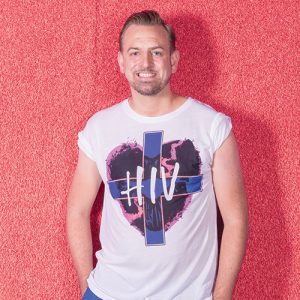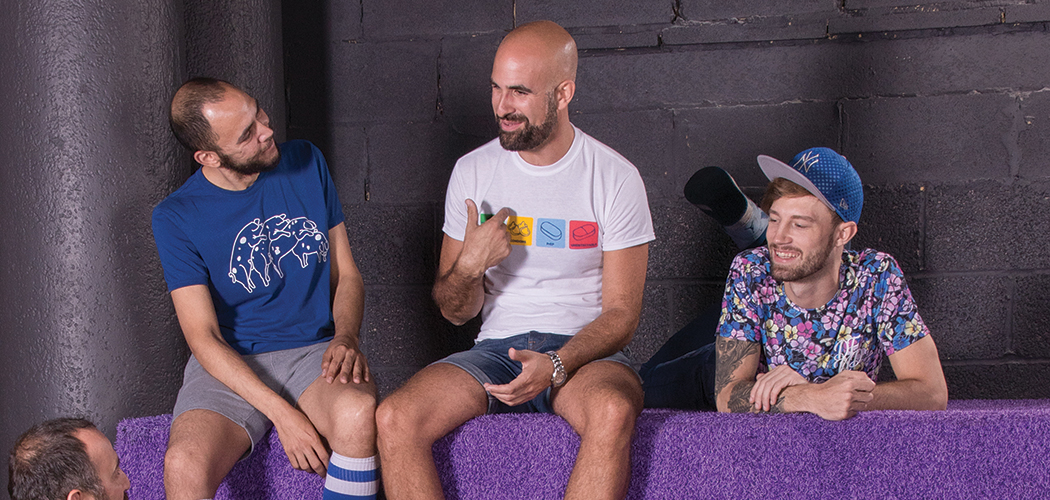London’s HIV prevention campaign, Do It London, conducts outreach work across the capital at venues such as XXL, Ku Bar and Clonezone on behalf of the capital’s Local Authorities. Last week we brought together four guys who make different HIV prevention choices with Paul Steinberg – Lead Commissioner, London HIV Prevention Programme (LHPP), and Head of Campaigns and Communications for Do It London – to discuss sex, dating and relationships.
Our group chat, below, demonstrates that attitudes, understanding and knowledge around HIV is changing, and that conversations about people’s statuses and sexual practices are happening in real time, both in terms of dating and at sex clubs.
The Do It London campaign aims to communicate information on HIV prevention choices to the general public so that conversations like ours are not seen as weird or uncomfortable or taboo, but to normalise these conversations – however brief – and to help destigmatise sex, HIV and PrEP so we can all make better sexual health decisions.

John, Ku Bar – 27, negative, uses condoms
Boyz: Hi John. Explain why you use condoms.
J: I use condoms because even when I was young at school that was what was taught, and that just stuck with me. Also, being part of the gay scene, there’s a higher chance of me getting something like HIV, which has always been in the back of my mind. It’s never necessarily scared me because I read up on it, so I learned what is it, how you get it, and most of the time it’s through one silly mistake, or trusting someone who you shouldn’t have trusted. I know quite a few people who have HIV, so that’s been a huge learning curve for me as well. HIV’s a massive game-changer, but I don’t fear it. I know some people who are negative have this constant fear of not wanting to date a guy with HIV, or trying to limit their friend group to people that don’t have it, but it’s not something that’s made me make a decision on somebody, because it’s not something they chose to have, so I can’t really judge them for it.
And also, recent studies mean that you can have sex with someone who has HIV if they’re undetectable without protection and there’s no risk.
J: This is the other thing: some people know this now, but not a lot of people. Even among some areas of the LGBT+ community it can still be a grey area.
Have you thought about taking PrEP?
J: Yes. More and more of my friends are now taking it as a precaution. I have thought about it, but I don’t know that much about PrEP to actually make a decision on whether I want to take it or not, which is something I need to read up on, or speak to someone at a sexual health clinic.
And do you get tested regularly?
J: I do, yeah. I make sure I get tested every three months.
So you would be open to taking PrEP?
J: Oh yeah. If it’s something that’s going to help prevent the spread [of HIV], then definitely.
Because then someone at the clinic would explain that you could stop using condoms if you wanted to.
J: But that would then open a door to other infections as well, which PrEP doesn’t cover, so I wouldn’t be open to losing condoms as well.
So, for you, PrEP would be another layer of protection?
J: Yeah.

Ashley, Clonezone – 31, in an open relationship, negative, on PrEP for six months, top
Boyz: Hi Ashley. Do you buy PrEP yourself?
A: No, I’m on the IMPACT trial.
And why did you go on the trial?
A: I wasn’t super-at-risk because my partner is HIV undetectable, but we recently decided to open up our relationship, and I’ve been going to sex clubs, and I don’t like wearing condoms, so having that protection [with PrEP] – although I know it doesn’t protect from everything – but having that safety net in my mind is nice to have.
So when you’re at the sex clubs, presumably that would mean anonymous sex, multiple partners in one night…?
A: Yes.
So we know there’s less risk for a top, but it’s still great that you are using PrEP to protect yourself.
A: Yes, although there have been times when a partner in the sex club has asked me to put a condom on, and I do so, because it’s their bum, their rules.
I do think there are certain tops who would’ve said ‘no’ and walked off, but if that’s what the bottom wants then fair enough.
What’s great is that even in those situations there are still the smallest of conversations taking place between two people about sexual health decisions and HIV prevention choices…
A: Well, funny story: this guy got a condom on me and I didn’t even realise. I had no idea. I think he did it with his mouth – the old blowjob-condom trick – and we didn’t even say a word to each other. I must say, the majority of the sex I have [in sex clubs] is bareback, but if I’m asked [to put a condom on] I won’t refuse.
So before you were on PrEP, how did you and your HIV undetectable partner have sex?
A: So for the first year of our relationship we were playing safe [using condoms], but after a year or so it was around that time when studies were coming out that said being undetectable meant you couldn’t pass it on.
So it was once the U=U message (undetectable = untransmittable) came out and started to become more widespread that you understood it and you realised that there’s no risk and decided to stop using condoms?
A: Yes.

Panikkos, XXL – 36, single, top, negative, on PrEP for six months
Boyz: Hi Panikkos. When you hook up with a guy, do you tell them you’re on PrEP?
P: Yes.
And have you stopped using condoms?
P: Yes and no.
When would you use one?
P: When I’m at a sex party I would use condoms, regardless of PrEP or not. If I’m one-on-one, I’d rather not, depending on the other person.
Are you on the IMPACT trial?
P: No, I buy my own online.
Why did you start using PrEP?
P: PrEP is a way to stop HIV from being spread. It’s one way to stop me getting it and from passing it on as well.
And when you’re on PrEP you have to be tested every three months anyway, don’t you?
P: Yes, I have two different tests: one blood, one urine.
Have you had any problems being on PrEP?
P: No. At the beginning I read that some people can feel nauseous or weak, but ever since day one I’ve been fine. I just take one pill every day – apart from that, nothing has changed.
You said you continue to use condoms at sex parties – if you’re now on PrEP, why do you still use them?
P: PrEP doesn’t prevent all diseases, it just prevents HIV, but there are other diseases like syphilis and gonorrhoea and things like that which condoms help to protect against.
Do you think that being on PrEP has changed your behaviour and attitude towards sex, compared to when you weren’t on it?
P: It made me less concerned about whether other guys are positive or not, and whether they’re recently diagnosed or undetectable or whatever. I’ve protected myself and I know I’m protected.
If you weren’t on PrEP and was going to have sex with someone who was undetectable, would you use a condom?
P: If he was open about his status and I knew he was HIV undetectable, I wouldn’t be worried about not using a condom because I know there’s no risk. But if he was last checked six, seven, eight months ago, then his status could have changed in that time, so then I would use a condom.
Panikkos and Ashley, do you take PrEP every day or do you use a more event-based dosing approach?
P: Every day.
A: I was thinking about event-based but I know what my memory is like, and you just don’t know what might happen [i.e. unplanned sexual encounters].
So it’s just easier to take it every day?
A: Yeah.
P: I just set an alarm on my phone and take it at the same time every day.
John: Do you take it because of a health and safety risk that you believe that you might have due to the situations you get yourselves into, or do you take it because you just want to fuck around and have fun?
A: No, I take it because I know how I am about wearing condoms; I don’t like them. I know that means I’m not protected from everything, but HIV – even though it’s not the life and death situation it was before combination therapy was discovered – it’s still something I’d rather not get.
P: If everyone on the gay scene who are more at risk of contracting HIV took PrEP then the virus would stop being spread. And if more people tested then those with HIV would find out their status and start treatment and become undetectable.
Paul Steinberg: So those two prevention methods – PrEP and undetectable – both of those require people to get tested. You can’t take PrEP until you’re tested, and you can’t become undetectable until you’re tested and on medication, so we’re still trying to promote regular testing, because there’s still 3,000 to 5,000 gay men with HIV that don’t know it in the UK.
A: I always tell people that I would much rather have bareback sex with a guy who is undetectable than with a guy who doesn’t get tested regularly and has no idea what his status is, because with an undetectable guy you know the score and that the chances of passing anything on is miniscule.
J: Since PrEP has become more widely used, what I’m finding more and more about wearing condoms is that it can be awkward to stop what’s going on to say ‘Look, would you mind putting on a condom please?’ and because the other guy says he’s on PrEP, that that makes not using a condom fine. And so you just kind of go through with it [condomless sex].
Boyz: But this campaign is about giving people the information, and therefore the confidence and power, to just ask a question, and not feel as though you’re being swept away with the current and end up doing something you’d rather not.

Paul Steinberg: One of the things that we’re aware of is it’s almost like we have this singular approach to our sexual health, so for many, many years it was ‘condoms, condoms, condoms’, then it was ‘test, test, test, test, test’, and then it became ‘PrEP, PrEP, PrEP, PrEP’, and now increasingly we’re talking about undetectable. What we’re trying to do with this campaign is say these things are all going on at once, and our combination message is that it’s OK to talk about it.
P: When I first started telling my friends that I was going to take PrEP they said to me ‘Why do you feel you have to take a pill every day? Just wear a condom.’ But, for me, I don’t like condoms and I lose my erection with them.
A: Exactly, same here.
P: I do, I really do. Even with the skin ones, I still lose them, I don’t know why.
But that’s why it’s such a personal thing, so for other guys a condom is absolutely fine.
A: I prefer not to.
P: I would choose not to if I had the choice. But if the guy I’m with wants me to then I will.
So PrEP has given you the freedom to lose condoms more frequently than you used to?
P: Yes, it makes you less concerned about getting the virus.
J: I think it’s important a if you’re with a guy and he’s a bottom and things heat up, he might feel awkward about saying ‘Can you put a condom on?’ It’s important for the top to ask as well.
P: But if you’re a bottom and you want someone to use a condom then you should be able to say that.
A: It takes two to tango.

David Robson XXL DJ – 34, single, HIV undetectable
There should be a conversation. If you’re about to fuck then you’re about to do one of the most personal things you can do with another person, so just have that conversation.
David: Those people [who feel awkward] need to feel like they can ask those questions because, let’s face it, the sex education system is fucked, still, so until that’s fixed it will continue again and again, and that’s why we’re still having these conversations. Eight years ago it was completely different; I remember even before I got HIV I went to have sex with somebody and he told me he was undetectable and I turned around and went home, and I felt guilty for that for years, but it was because it was my fear, that climate of fear that hangs around it. So when it happened to me, of course now I understand everything inside and out, but then I just didn’t know.
How quickly after your diagnosis did you understand what undetectable meant?
D: Oh quite quickly, around 2012.
And how have you found having conversations with partners about it?
D: Well I fell completely into the chemsex lot, so you bareback or nothing, so you obviously avoided the conversation then, and so that became my coping mechanism for years. But now, post-chemsex, I do have conversations about it, but if push comes to shove I just do not feel sexual at all anymore. And I don’t know whether that’s a bit of post-traumatic stress and all the trauma that comes with the baggage of those issues, and I’ve had sober sex and enjoyed it, but I look back and think I’ve done enough of that over the last 10 years, so right now is just a little self-care.
But going forward, your status now – undetectable – should give you confidence for the future, shouldn’t it?
D: Oh completely. And I do feel empowered by it, and if anyone has a problem with it then that’s their problem.
A: My partner didn’t tell me until our fourth date that he had HIV. And I hate to admit it but I never wanted to see him again. But I was ignorant of HIV, because I’d pretty much only just come out, and it wasn’t until I’d spoken to other people that I realised it’s not the easiest thing to tell someone else. And it’s not even like I was at risk because we’d been safe.
Well that’s because we’ve all been conditioned for years and years to keep HIV at arm’s length, and so it’s a gradual thing of understanding how times are now. Thanks so much for talking to us.
Upcoming outreach dates
9 and 23 August, 4pm – 6pm at The Duke of Welly, 77 Wardour Street, W1D 6QA.
10 and 24 August, 4.30pm – 6.30pm at The Vault, 139 Whitfield Street, W1T 5EN.
11 August, 10pm – 7am at XXL at Pulse, 1 Invicta Plaza, South Bank, SE1 9UF.
16 August and 5 September, 4pm – 6pm at Clonezone Soho, 35 Old Compton Street, W1D 5JX.
19 August and 2 September, 3pm – 6pm at Sailors Sauna, 570-574 Commercial Road, E14 7JD
Many thanks to the team at XXL and Pulse for hosting the photo shoot and group chat, and to all partner venues for helping promote the campaign.
For more information about HIV prevention methods, including where to buy PrEP, visit doitlondon.org














